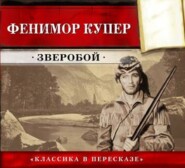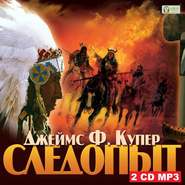По всем вопросам обращайтесь на: info@litportal.ru
(©) 2003-2024.
✖
The Spy: Condensed for use in schools
Настройки чтения
Размер шрифта
Высота строк
Поля
“Let me – let me go to my father, and you shall have all of it.”
“I swear you shall go then,” said the Skinner.
“Here, take the trash,” cried Birch, as he threw aside the purse, which he had contrived to conceal, notwithstanding the change in his garments.
The robber raised it from the floor with a fiendish laugh.
“Aye, but it shall be to your father in heaven.”
“Monster! have you no feeling, no faith, no honesty?”
“To hear him, one would think there was not a rope around his neck already,” said the other laughing. “There is no necessity for your being uneasy, Mr. Birch; if the old man gets a few hours the start of you in the journey, you will be sure to follow him before noon to-morrow.”
This unfeeling communication had no effect on the peddler, who listened with gasping breath to every sound from the room of his parent, until he heard his own name spoken in the hollow, sepulchral tones of death. Birch could endure no more, but shrieking out:
“Father! hush – father! I come – I come!” he darted by his keeper, and was the next moment pinned to the wall by the bayonet of another of the band. Fortunately, his quick motion had caused him to escape a thrust aimed at his life, and it was by his clothes only that he was confined.
“No, Mr. Birch,” said the Skinner, “we know you too well for a slippery rascal, to trust you out of sight – your gold, your gold!”
“You have it,” said the peddler, writhing in agony.
“Aye, we have the purse, but you have more purses. King George[71 - George III., King of England.] is a prompt paymaster, and you have done him many a piece of good service. Where is your hoard? Without it you will never see your father.”
“Remove the stone underneath the woman,” cried the peddler, eagerly; “remove the stone.”
“He raves! He raves!” said Katy, instinctively moving her position to a different stone from the one on which she had been standing. In a moment it was torn from its bed, and nothing but earth was seen underneath.
“He raves! you have driven him from his right mind,” continued the trembling spinster; “would any man in his senses keep gold under a hearth?”
“Peace, babbling fool!” cried Harvey. “Lift the corner stone, and you will find that which will make you rich, and me a beggar.”
“And then you will be despisable,” said the housekeeper bitterly. “A peddler without goods and without money is sure to be despisable.”
“There will be enough left to pay for his halter,” cried the Skinner, who was not slow to follow the instructions of Harvey, soon lighting upon a store of English guineas. The money was quickly transferred to a bag, notwithstanding the declarations of the spinster that her dues were unsatisfied, and that, of right, ten of the guineas were her property.
Delighted with a prize that greatly exceeded their expectations, the band prepared to depart, intending to take the peddler with them, in order to give him up to the American troops above, and to claim the reward offered for his apprehension. Everything was ready, and they were about to lift Birch in their arms – for he resolutely refused to move an inch – when a form appeared in their midst, which appalled the stoutest heart among them. The father had risen from his bed, and he tottered forth at the cries of his son. Around his body was thrown the sheet of the bed, and his fixed eye and haggard face gave him the appearance of a being from another world. Even Katy and Cæsar thought it was the spirit of the elder Birch, and they fled the house, followed by the alarmed Skinners in a body.
The excitement, which had given the sick man strength, soon vanished; and the peddler, lifting him in his arms, reconveyed him to his bed. The reaction of the system hastened to close the scene. The glazed eye of the father was fixed upon the son; his lips moved, but his voice was unheard. Harvey bent down, and, with the parting breath of his parent, received the parting benediction.
The Skinners had fled precipitately to the wood, which was near the house of Birch, and once safely sheltered within its shades, they halted, and mustered their panic-stricken forces.
CHAPTER X.
A COLONIAL REPAST
The family at the Locusts had slept, or watched, through all the disturbances at the cottage of Birch, in perfect ignorance of their occurrence. Additional duties had drawn the ladies from their pillows at an hour somewhat earlier than usual.
Henry Wharton awoke from a sleep in which he had dreamt of suffering amputation; and Dr. Sitgreaves pronounced that he would be a well man within a fortnight. Colonel Wellmere did not make his appearance; he breakfasted in his own room, and the surgeon was free to go to the bedside of Captain Singleton, where he had watched during the night without once closing his eyes. Captain Lawton had been received with many courteous inquiries after the state of his health.
A single horse chaise was seen approaching the gate. Miss Peyton advanced to receive their guest. She was young, and of a light and graceful form, but of exquisite proportions. As Dr. Sitgreaves supported her from the chaise, she turned an expressive look at the face of the practitioner.
“Your brother is out of danger, and wishes to see you, Miss Singleton,” said the surgeon.
By the time the afternoon sun had travelled a two hours’ journey from the meridian, the formal procession from the kitchen to the parlor commenced, under the auspices of Cæsar, who led the van, supporting a turkey on the palms of his withered hands with the dexterity of a balance-master.
Next followed the servant of Captain Lawton, bearing, as he marched stiffly, a ham of true Virginian flavor, a present from the spinster’s brother in Accomac. The supporter of this savory dish kept his eye on his trust with military precision; and it might be difficult to say which contained the most juice, his own mouth or the bacon.
Third in the line was to be seen the valet of Colonel Wellmere, who carried in either hand chickens fricasseed, and oyster patties.
After him marched the attendant of Dr. Sitgreaves, who instinctively seized an enormous tureen and followed on in place, until the steams of the soup so completely bedimmed his glasses that he was compelled to deposit his freight on the floor, until, by removing them, he could see his way through the piles of reserved china and plate-warmers.
Next followed another trooper, conveying a pair of roast ducks. The white boy who belonged to the house brought up the rear, groaning under a load of sundry dishes of vegetables that the cook, by the way of climax, had unwittingly heaped on him.
Cæsar had no sooner deposited his bird than he turned mechanically on his heel, and took up his line of march again for the kitchen. In this evolution the black was imitated by his companions in succession, and another procession to the parlor followed in the same order. By this admirable arrangement, whole flocks of pigeons, certain bevies of quails, shoals of flat-fish, bass, and sundry woodcock, found their way into the presence of the company.
A third attack brought suitable quantities of potatoes, onions, beets, cold-slaw, rice, and all the other minutiæ[72 - little details.] of a goodly dinner.
The board now fairly groaned with American profusion, and Cæsar, glancing his eye over the show with a most approving conscience after readjusting every dish that had not been placed on the table by his own hands, proceeded to acquaint the mistress of the revels that his task was happily accomplished.
Much time and some trouble were expended before the whole party were, to the joy of Cæsar, comfortably seated around the table.
Though the meat and vegetables had made their entrance with perfect order and propriety, their exeunt[73 - departure (literally, they go out).] was effected much in the manner of a retreat of militia. The point was to clear the board something after the fabled practice of the harpies; and by dint of scrambling, tossing, breaking, and spilling, the remnants of the overflowing repast disappeared. And now another series of processions commenced, by virtue of which a goodly display of pastry, with its usual accompaniments, garnished the table.
CHAPTER XI.
THE PEDDLER’S CAPTURE
In the confusion and agitation produced by the events we have recorded, the death of the elder Birch had occurred unnoticed; but a sufficient number of the immediate neighbors were hastily collected, and the ordinary rites of sepulture[74 - burial.] were paid to the deceased. Birch supported the grave and collected manner that was thought becoming in a male mourner.
The muscles of the peddler’s face were seen to move, and as the first clod of earth fell on the tenement of his father, sending up that dull, hollow sound that speaks so eloquently the mortality of man, his whole frame was for an instant convulsed. He bent his body down, as if in pain, his fingers worked, while the hands hung lifeless by his side, and there was an expression in his countenance that seemed to announce a writhing of the soul; but it was not unresisted, and it was transient. He stood erect, drew a long breath, and looked around him with an elevated face, that seemed to smile with a consciousness of having obtained the mastery. The grave was soon filled; a rough stone, placed at either extremity, marked its position, and the turf, whose faded vegetation was adapted to the fortunes of the deceased, covered the little hillock with the last office of seemliness. Uncovering his head, the peddler hesitated a moment to gather energy, and spoke.
“My friends and neighbors,” he said, “I thank you for assisting me to bury my dead out of my sight.”
A solemn pause succeeded the customary address, and the group dispersed in silence. The peddler and Katy were followed into the building by one man, however, who was well known to the surrounding country by the significant term of “a speculator.” Katy saw him enter, with a heart that palpitated with dreadful forebodings; but Harvey civilly handed him a chair, and evidently was prepared for the visit.
The peddler went to the door, and, taking a cautious glance about the valley, quickly returned and commenced the following dialogue:
“The sun has just left the top of the eastern hill; my time presses me; here is the deed for the house and lot; everything is done according to law.”
The other took the paper, and conned its contents with a deliberation that proceeded partly from caution, and partly from the unlucky circumstances of his education having been much neglected when a youth. The time thus occupied in this tedious examination was employed by Harvey in gathering together certain articles which he intended to include in the stores that were to leave the habitation with himself.
“I’m rather timersome about this conveyance,” said the purchaser, having at length waded though the covenants[75 - agreements.] of the deed.
“Why so?”
“I’m afraid it won’t stand good in law. I know that two of the neighbors leave home to-morrow morning, to have the place entered for confiscation;[76 - forfeiting to the public treasury.] and if I should give forty pounds and lose it all, ’twould be a dead pull back to me.”
“They can only take my right,” said the peddler; “pay me two hundred dollars, and the house is yours; you are a well-known Whig,[77 - supporter of the American cause.] and you at least they won’t trouble.” As Harvey spoke, there was a strange bitterness of manner, mingled with the shrewd care expressed concerning the sale of his property.

















